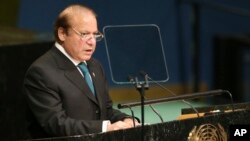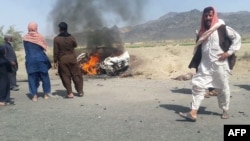Pakistan’s Prime Minister Nawaz Sharif reiterated Wednesday that only a dialogue between the Afghan government and the Taliban can end decades of conflict and suffering in neighboring Afghanistan.
Speaking to the annual United Nations General Assembly, Sharif said his country has been helping the Afghan reconciliation in response to requests from Afghan President Ashraf Ghani.
“There have been setbacks,” Sharif said. “That, however, is not a sufficient reason to abandon the path of peace and rely on the military option, which has failed, for the past decade and a half, to stabilize Afghanistan.”
Sharif said that years of conflict and chaos in Afghanistan have had grave security and economic consequences for his country because of the nearly 3 million Afghan refugees there.
“We hope to see them return to Afghanistan, voluntarily and with dignity,” Sharif said.
The prime minister said his country's anti-terrorism campaign has resulted in death or injury to tens of thousands of Pakistan civilians and security forces. The military operations, he said, have turned the tide against terrorism.
Kabul points finger at Islamabad
Sharif spoke just hours after Afghan Vice President Sarwar Danesh, in his speech to the U.N. session, alleged that “merciless attacks from terrorist groups” against Afghan civilians originate in Pakistan.
Despite numerous calls on Pakistan to destroy terrorist havens, Danesh said, authorities there have not acted.
“We ask all of you: Where were the previous leaders of the Taliban and al-Qaida residing, and where were they killed? At this very moment, where are the leaders of the Taliban and Haqqani network located? From where and how are terrorists being trained, equipped and financed during a full-scale war?” Danesh asked.
The founder of the Taliban, Mullah Omar, died in a Pakistani hospital, according to Afghan officials, and his successor, Mullah Mansoor, was killed in a U.S. drone attack in Pakistan’s southwestern Baluchistan province. The country's military and its spy agency are allegedly providing support to the Taliban.
‘Good and bad terrorists’
Again the Afghan vice president accused Pakistan of differentiating between “good and bad terrorists."
He was voicing long-running Afghan and American allegations that Pakistani security forces target militants linked to the anti-Pakistan Taliban, but spare insurgents linked to the Afghan Taliban and the Haqqani network, who plot attacks inside Afghanistan.
Islamabad rejects the accusations and insists that camps for Afghan refugees in Pakistan have become hiding places for Afghan insurgents and anti-Pakistan militants.
Without directly commenting on the allegations from the Afghan vice president, the Pakistani prime minister insisted that “progress [toward peace] will be assured only when the Afghan parties themselves conclude that there is no military solution to the Afghan war."
Pakistan and Afghanistan each accuse the other of supporting militant and terrorist attacks, which has sent bilateral ties between the nations to new lows.
Pakistani authorities refuse to use force against Afghan insurgents on their soil, fearing the insurgents would join with the Pakistani Taliban to threaten Islamabad’s hard-earned successes against terrorism.





